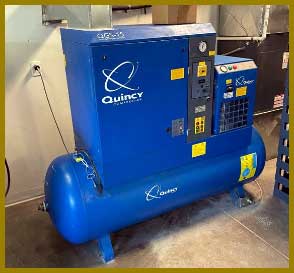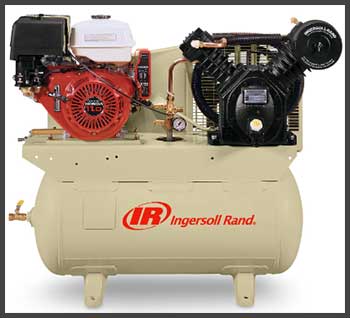In the world of air compressors, two brands have consistently stood out from the rest: Quincy and Ingersoll Rand. Both have earned a reputation for producing high-quality, reliable compressors that are used across various industries.
In this article, we’ll take an in-depth look at Quincy and Ingersoll Rand compressors, comparing their pros and cons to help you make an informed decision when choosing the right air compressor for your needs.
A Brief Comparison Table
| Feature | Quincy Compressor | Ingersoll Rand Compressor |
| Durability & Longevity | High (Decades with proper maintenance) | Slightly lower, but still durable |
| Energy Efficiency | High (Patented pressure lubrication system and advanced airend technology) | Lower compared to Quincy |
| Range of Models | Wide variety (Small portable to large industrial-grade) | Wide variety (Small portable to large industrial-grade) |
| Price | Higher price tag | More affordable |
| Global Presence | Limited (Mainly in the USA) | Strong (Worldwide) |
| Replacement Parts & Service | May be harder to find in some regions | Easily available worldwide |
Quincy Compressors: Pros
- Durability and Longevity

Quincy air compressors are renowned for their durability and longevity.
With a solid cast iron construction, they’re built to withstand the rigors of heavy-duty usage.
Many Quincy compressors are known to last for decades with proper maintenance, making them an ideal choice for businesses that require long-term, reliable performance.
- Energy Efficiency
Quincy compressors are designed with energy efficiency in mind, ensuring that you get the most value for your money.
The brand’s patented pressure lubrication system and advanced airend technology help to minimize energy consumption, resulting in lower operating costs for your business.
- Wide Range of Models
Quincy offers a wide variety of air compressor models, ranging from small, portable units to large, industrial-grade compressors.
This ensures that there’s a Quincy compressor to suit every application, whether you need a compact unit for home use or a high-performance compressor for a manufacturing plant.
Quincy Compressors: Cons
- Price
Quincy air compressors tend to be on the pricier side, especially when compared to Ingersoll Rand compressors.
While their durability and longevity justify the price tag, it may be a barrier for some buyers who are on a tight budget.
- Limited Global Presence
Quincy’s global presence isn’t as widespread as Ingersoll Rand’s, which may make it more difficult to find parts or service centers in some regions.
This could be a concern if you require prompt assistance or need replacement parts for your Quincy compressor.
Ingersoll Rand Compressors: Pros

- Affordability
Ingersoll Rand compressors are generally more affordable than Quincy compressors, making them an attractive option for budget-conscious buyers.
Despite their lower price point, Ingersoll Rand compressors still deliver reliable performance and durability.
- Versatility
Ingersoll Rand offers a diverse range of air compressors, ensuring that there’s a model to suit every need.
From small, portable units to large, industrial-grade compressors, you’re sure to find an Ingersoll Rand compressor that fits your requirements.
- Global Presence
Ingersoll Rand has a vast global presence, making it easier to find parts and service centers for their compressors. This is a significant advantage if you require prompt assistance or need replacement parts for your Ingersoll Rand compressor.
Ingersoll Rand Compressors: Cons
- Lower Energy Efficiency
Ingersoll Rand compressors may not be as energy-efficient as their Quincy counterparts. This could result in higher operating costs over time, especially if you use your compressor frequently.
- Slightly Shorter Lifespan
While Ingersoll Rand compressors are known for their durability, they may not last as long as Quincy compressors. With proper maintenance, however, you can still expect a reasonably long lifespan from an Ingersoll Rand compressor.
Frequently Asked Questions (FAQ)
Quincy Compressor is a subsidiary of Atlas Copco, a leading global provider of industrial equipment and solutions.
Yes, Quincy air compressors are made in the USA. The company has a manufacturing facility in Bay Minette, Alabama, where they produce a wide range of air compressors for various industries.
Ingersoll Rand is a part of Trane Technologies and has several well-known brands under its umbrella, including Trane, Thermo King, ARO, and Club Car.
Ingersoll Rand is a multinational company that manufactures and sells industrial equipment, including air compressors. The company was founded in 1871 and has its headquarters in Davidson, North Carolina, USA.
Ingersoll Rand air compressors are made by Ingersoll Rand itself. The company has manufacturing facilities in various locations around the world to produce a wide range of air compressors and other industrial equipment.
Conclusion
When it comes to choosing between Quincy and Ingersoll Rand compressors, there are several factors to consider. Quincy compressors offer excellent durability, energy efficiency, and a wide range of models but come with a higher price tag and limited global presence.
On the other hand, Ingersoll Rand compressors are more affordable, versatile, and have a strong global presence but may not be as energy-efficient or have as long a lifespan as Quincy compressors.
Ultimately, the choice between Quincy and Ingersoll Rand compressors depends on your specific needs, budget, and preferences.
Taking the time to research two competing air compressor brands is critical as they both possess unique strengths and weaknesses. Weighing these factors can help guide your decision-making process toward the most suitable option for your specific needs.
Carefully considering each product’s pros and cons will ultimately lead to selecting a reliable and long-lasting air compressor—an investment worthwhile for both personal or business use.



